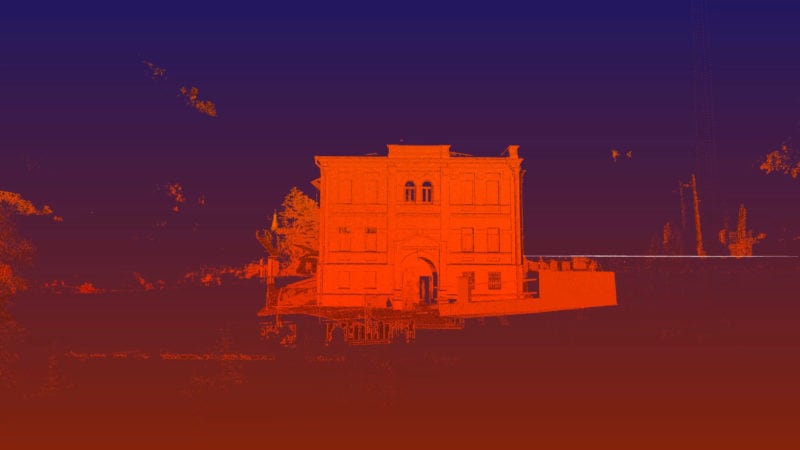
Biennale de l’Image en Mouvement 2018
Film screenings
Following the premieres of the films presented during the opening days of the Biennale de l’Image en Mouvement, the nine films produced for the occasion are screened daily at Cinema Dynamo.
See the timetable of the screenings (changed monthly) on the left of this page.
Rosarium
- Sarah Abu Abdallah
- 2018
- Saudi Arabia/Switzerland
- 10 min
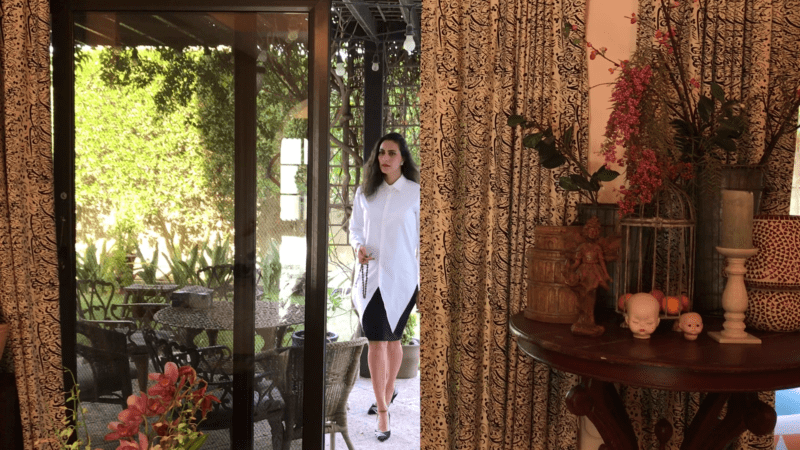
For Rosarium, Sarah Abu Abdallah works in collaboration with Saudi filmmaker Reem al-Bayyat. The film tackles crying and shedding tears in both the romanticist and the ritualistic sense. The star of the film is the actress Rana Alamuddin, who we follow around her house as she attempts with resilience to resist the everyday through the act of crying. What at first appears to be a perfect household turns out to be a hallucination that unravels as the film goes on. Sarah Abu Abdallah (b. 1990, Qatif, SA. Lives and works in Qatif, SA ) works across a variety of media including video, installation, poetry and images. Her work creates speculative spaces and assembles narratives colored by the absurdity and awkwardness found in the mundane.
Restored Communication
- Neïl Beloufa
- 2018
- Iran/France/Switzerland
- 77 min
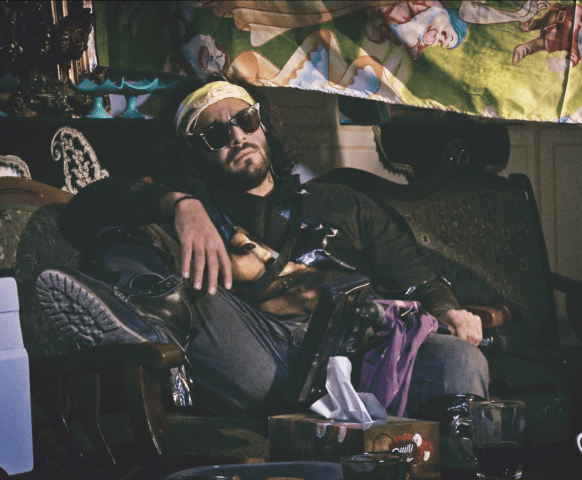
Reality TV—a political form in which a group of isolated people disagree and compete—is one of the dominant clichés of Western representation. Shot in Iran, where reality shows are not yet widespread, Restored Communication stages candidates cut off from the world, who replay different seizures of power in various political contexts. In this system, as artificial as it is liberal, the competitors are locked up, filmed without interruption and subjected to the injunctions of a voice-over. Deprived of food, the voice, and contact with the outside world, they seem helpless, reflecting the stereotypical image of Iran’s geopolitical isolation. Between schoolboyish fiction and documentary, the film slowly turns into a scathing genre film in which even a water pistol can kill. Neïl Beloufa’s (b. 1985, Paris, FR. Lives and works in Paris, FR) films, sculptures, and installations reflect his opposition to all forms of hierarchy and mix genres without concession. He skillfully reconciles the disenchantment of his generation with the hope instilled by alternative systems.
- Irene Dionisio
- 2018
- Italy/Switzerland
- 16 min
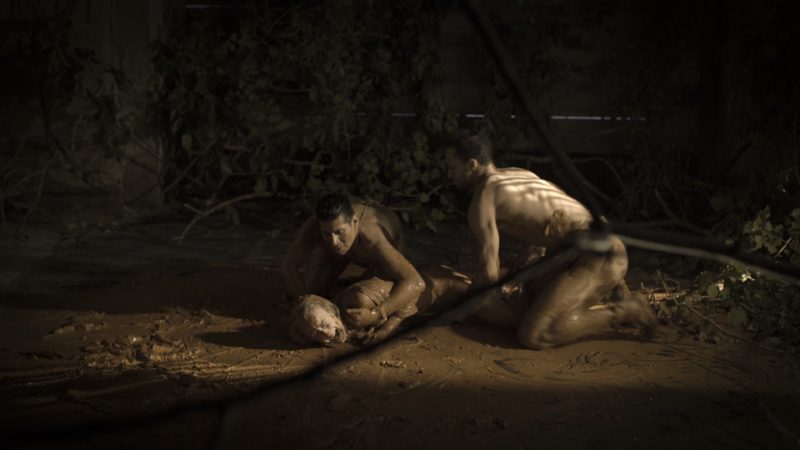
Il mio unico crimine è vedere chiaro nella notte addresses the issues of censorship in Italian cinema and psychological removal in art. The work’s title—my only crime is seeing clearly in the night—incisively highlights the conflict at the basis of creation and censorship. The film, with its re-imagining of film fragments, cut out and eliminated with bureaucratic scrupulousness, doggedly retraces the cuts inflicted on the productions of past masters and thinks them through once again as the signs of a cinema yearning to be completed. The cut, which aims to interrupt the relationship between the gaze and the possible, instead becomes a place to be repopulated with… ghosts.
This Action Lies (Cest Action Gist)
- James N. Kienitz Wilkins
- 2018
- USA/Switzerland
- 32 min
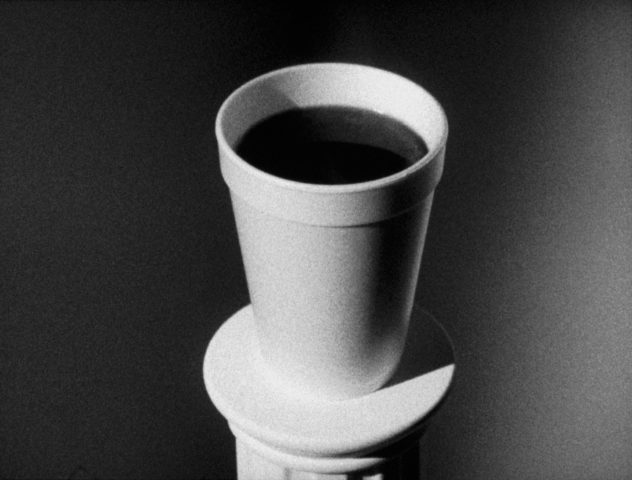
This Action Lies is a movie about the limits of observation, about staring very hard at something while listening to something else. It is a paranoid polyphonic apology of a simple act: offering three perspectives of an object that may not exist in a room that cannot exist, while at the mercy of a mistrustful monologue. In other words, a defense of cinema. This project expands ideas introduced in one of Kienitz Wilkins’ previous films, Indefinite Pitch (2016), and is similarly voice-driven, using an extended monologue to analyze a common and underappreciated commercial product, elevating it to the status of an almost Platonic form. James N. Kienitz Wilkins’ (b. 1983, Boston, US. Lives and works in New York, US) dynamic works are distinctive in their investigation of language, their unconventional approach to performance, and their exploration of conversation as a potent transmitter of ideas. Most of his films are the result of some conceptual procedure, a decision either to treat his original footage according to some abstract system or to apply his own logic to found material.
O Vermelho do Meio-Dia
- Tobias Madison
- 2018
- Brasil/Switzerland
- 45 min
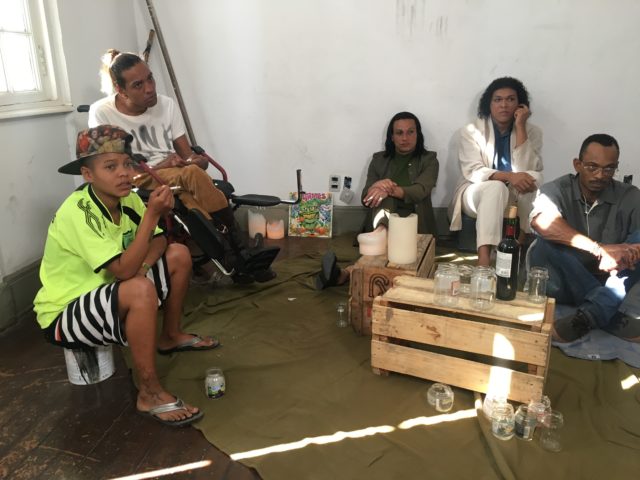
O Vermelho do Meio-Dia occupies the space between documentary and improvisation, enabling an investigation of the idea of the Other as well as its various constructed perspectives and depictions. The film interweaves two stories which fundamentally diverge despite overlapping. On the one hand, there is a party, its premises, guests, music, class, gender, which build a big “coming together.” On the other hand, a conversation between transgender members of an art collective moves between scripted interactions and improvisation. Revolving around a Bataillean sadomasochistic tale about the falling outs in a community on the brink of war, the films hinges on a perspectivist interplay between scripted and “real” conflict. Tobias Madison (b. 1985, Basel, CH. Lives and works in New York, US and Zurich, CH) takes the isolated artistic process and expands it to include cooperative practice. He shuttles between refusal and participation, withdrawal and exposure, community spirit and calculated outsourcing. In doing so, he works his way at the edge of found formats: the work, the exhibition, as well as the figure of the “young” artist.
- Florent Meng
- 2018
- France/Switzerland
- 27 min
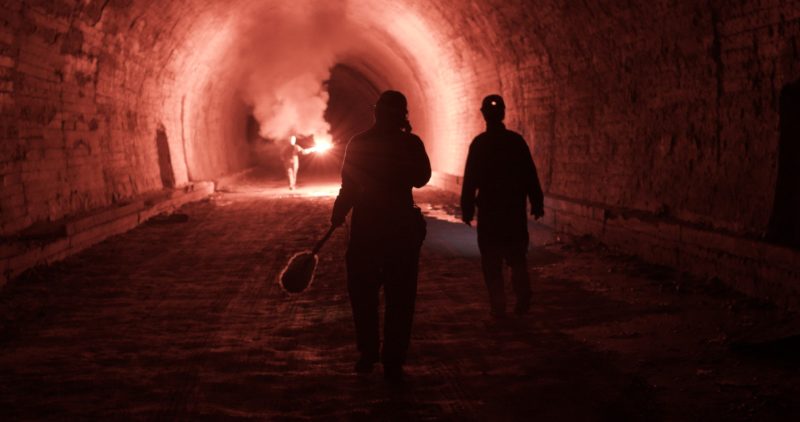
The Lost Line tells the story of a film crew that sets off to explore the Engaña, an eight kilometers abandoned tunnel that crosses the Cantabrian Mountains. For two decades, political prisoners and peasants built a railway linking the South to Northern Spain. When only the rails remained to be laid, the track was abandoned, and the tunnel collapsed. Following this forgotten path, the film crew discovers a research laboratory from Saragossa University, where scientists experiment on dark matter. Through conversations with a physicist, the film tries to understand the logic of dark matter research and the motivations of a man to spend his life waiting for a sign to come from the invisible. Trained as a photographer, Florent Meng (b. 1982, Paris, FR. Lives and works in Paris and Annemasse, FR) uses photographic series and film to develop a work between fiction and documentary around figures and forms of resistance. His works explore the influence of territories on community behaviors and the impact of these behaviors on the construction of a region’s or people’s identities.
After Scarcity
- Bahar Noorizadeh
- 2018
- Switzerland
- 32 min
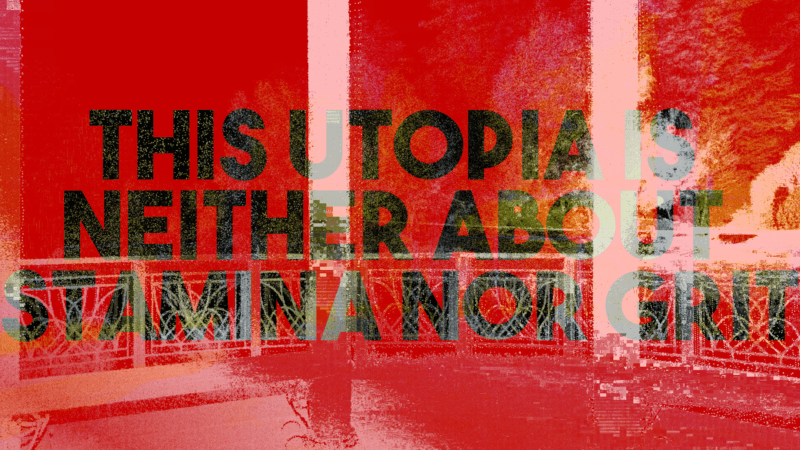
After Scarcity is a sci-fi-essay film that tracks Soviet cyberneticians (1950s-1980s) in their attempt to build a fully-automated planned economy, an attempt that finds traction today as a way of defying financialization. If the problem of socialism was time loss—too much bureaucracy, too much conversation, too many meetings—a socialism-on-speed, counting electricity plus statistics, could move past this limit. The film recounts the history of a moment in time when, against all odds, it seemed feasible to plan for the whole system at once—collective ownership of global resources with the programmed and networked efficiency of Wal-Mart. Bahar Noorizadeh (b. 1988, Tehran, IR. Lives and works in London, UK)is an artist, writer, and filmmaker. She works on the reformulation of hegemonic time narratives as they collapse in the face of speculation: philosophical, financial, legal, futuristic, etc. Noorizadeh’s practice examines the relationship between aesthetics and reason, and the desubjectification of experience as a pathway for producing new social subjects.
Abyss Film
- James Richards & Leslie Thornton
- 2018
- USA/Germany/Switzerland
- 60 min

For Abyss Film, Richards and Thornton intermix new videos with raw material from their own extensive archives. By doing so, they break with familiar forms of exhibition to share a kind of beginning in an open-ended encounter with the hidden and concrete aspects that characterize their respective works. Almost imperceptible attractions circumnavigate the breadth of their materials. This program follows upon their recent artist residency at CERN in January 2018, and the fitting observation that the largest machine in the world seeks in fact the smallest matter. Abyss Film speaks to possibilities made visible by the moving image, allowing a fall into the vertiginous pleasures of looking beyond and beyond again.
Parsi
- Eduardo Williams avec Mariano Blatt
- 2018
- Guinea-Bissau/Argentina/Switzerland
- 20 min
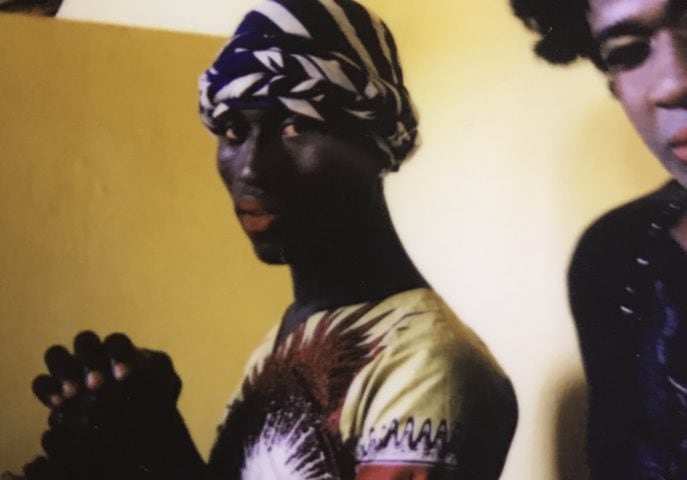
No es (It isn’t) is a cumulative poem by Mariano Blatt, whose constant writing process extends over a lifetime. The text of the poem, to which verses are added over days, months and years, can cover anything: images, people, memories, landscapes, phrases, ideas, etc. Having that list of “what seems to be but isn’t” ringing in his head, Eduardo Williams’ film Parsi observes in a perpetual movement the spaces and people to create another poem that is caressed, crashes and spins next to No es. Eduardo Williams’ (b. 1987, Buenos Aires, AR. Lives and works in Paris, FR) films explore a fluid mode of observation, looking for mutual relations and open adventures in a physical and virtual network. He believes that uncertainty can yield its own sources of beauty and forms of small-scale resistance through communal escape and shared complicity, so as to chart the rhythms of autonomy over automatism. Mariano Blatt (b. 1983, Buenos Aires, AR. Lives and works in Buenos Aires, AR) is a poet and literary editor. Mi juventud unida (Mansalva, 2015) collects his poems from 2005 to 2015. He co-directs Blatt & Ríos, an independent publishing house.